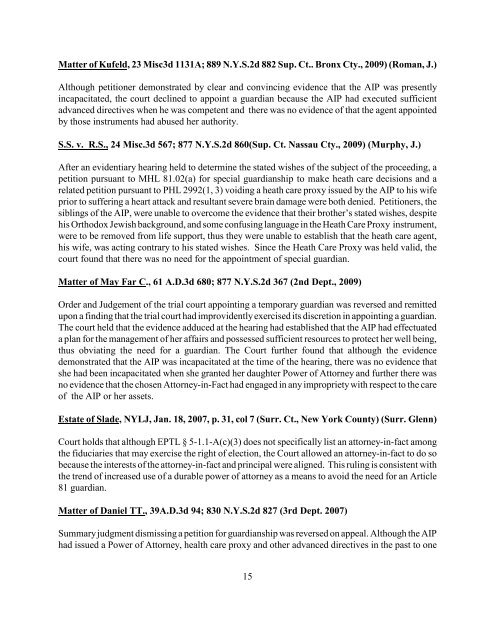MHL ARTICLE 81 - New York State Unified Court System
MHL ARTICLE 81 - New York State Unified Court System
MHL ARTICLE 81 - New York State Unified Court System
Create successful ePaper yourself
Turn your PDF publications into a flip-book with our unique Google optimized e-Paper software.
Matter of Kufeld, 23 Misc3d 1131A; 889 N.Y.S.2d 882 Sup. Ct.. Bronx Cty., 2009) (Roman, J.)<br />
Although petitioner demonstrated by clear and convincing evidence that the AIP was presently<br />
incapacitated, the court declined to appoint a guardian because the AIP had executed sufficient<br />
advanced directives when he was competent and there was no evidence of that the agent appointed<br />
by those instruments had abused her authority.<br />
S.S. v. R.S., 24 Misc.3d 567; 877 N.Y.S.2d 860(Sup. Ct. Nassau Cty., 2009) (Murphy, J.)<br />
After an evidentiary hearing held to determine the stated wishes of the subject of the proceeding, a<br />
petition pursuant to <strong>MHL</strong> <strong>81</strong>.02(a) for special guardianship to make heath care decisions and a<br />
related petition pursuant to PHL 2992(1, 3) voiding a heath care proxy issued by the AIP to his wife<br />
prior to suffering a heart attack and resultant severe brain damage were both denied. Petitioners, the<br />
siblings of the AIP, were unable to overcome the evidence that their brother’s stated wishes, despite<br />
his Orthodox Jewish background, and some confusing language in the Heath Care Proxy instrument,<br />
were to be removed from life support, thus they were unable to establish that the heath care agent,<br />
his wife, was acting contrary to his stated wishes. Since the Heath Care Proxy was held valid, the<br />
court found that there was no need for the appointment of special guardian.<br />
Matter of May Far C., 61 A.D.3d 680; 877 N.Y.S.2d 367 (2nd Dept., 2009)<br />
Order and Judgement of the trial court appointing a temporary guardian was reversed and remitted<br />
upon a finding that the trial court had improvidently exercised its discretion in appointing a guardian.<br />
The court held that the evidence adduced at the hearing had established that the AIP had effectuated<br />
a plan for the management of her affairs and possessed sufficient resources to protect her well being,<br />
thus obviating the need for a guardian. The <strong>Court</strong> further found that although the evidence<br />
demonstrated that the AIP was incapacitated at the time of the hearing, there was no evidence that<br />
she had been incapacitated when she granted her daughter Power of Attorney and further there was<br />
no evidence that the chosen Attorney-in-Fact had engaged in any impropriety with respect to the care<br />
of the AIP or her assets.<br />
Estate of Slade, NYLJ, Jan. 18, 2007, p. 31, col 7 (Surr. Ct., <strong>New</strong> <strong>York</strong> County) (Surr. Glenn)<br />
<strong>Court</strong> holds that although EPTL § 5-1.1-A(c)(3) does not specifically list an attorney-in-fact among<br />
the fiduciaries that may exercise the right of election, the <strong>Court</strong> allowed an attorney-in-fact to do so<br />
because the interests of the attorney-in-fact and principal were aligned. This ruling is consistent with<br />
the trend of increased use of a durable power of attorney as a means to avoid the need for an Article<br />
<strong>81</strong> guardian.<br />
Matter of Daniel TT., 39A.D.3d 94; 830 N.Y.S.2d 827 (3rd Dept. 2007)<br />
Summary judgment dismissing a petition for guardianship was reversed on appeal. Although the AIP<br />
had issued a Power of Attorney, health care proxy and other advanced directives in the past to one<br />
15

















